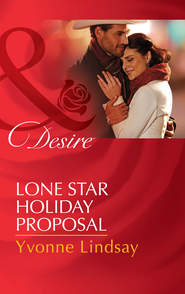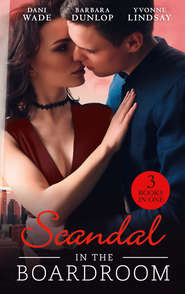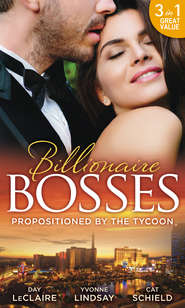По всем вопросам обращайтесь на: info@litportal.ru
(©) 2003-2025.
✖
Risking It All...: A High Stakes Seduction / For the Sake of the Secret Child
Автор
Год написания книги
2019
Настройки чтения
Размер шрифта
Высота строк
Поля
She looked up at an enlarged line drawing of a man and woman in more traditional-looking dress. “Is that how you imagine your ancestors looked?”
“Nope. That’s a real drawing done by the daughter of one of the first governors of Massachusetts in her personal journal. It was found by relentless digging through old records and hoping for the best. It’s time-consuming and way outside my realm of expertise, but it’s all coming together piece by piece.”
“Impressive.”
He led her through the gallery, then disarmed the emergency exit with a key code and pushed through an exterior door out into the bright sunlight. A large black truck was parked right behind the building. “My unofficial vehicle. Get in.”
“Where are we going?”
“To meet my grandparents.” Curious, she climbed in. His truck wasn’t quite as pristine as his sedan. He lifted a pile of papers off the passenger seat so she could sit down. There was an unopened can of soda in the cup holder, and music—the Doors—started as soon as he turned on the engine. There was also a Native American–looking thing with feathers on it hanging from the rearview mirror. “They’re going to like you. I can tell.”
“Why?” They were hardly likely to appreciate someone who was there for the express purpose of digging up dirt on their reservation.
“You’re nice.”
“Nice? I’m not nice at all.”
His loud laugh echoed through the cab. “True, it was cold of you to blow me off at lunch yesterday. But they’ll think you’re nice.”
She glanced at her reflection in the wing mirror nearest to her. She wasn’t sure anyone had accused her of being nice before. Organized, efficient, polite, helpful, exacting, prim, persnickety...a range of flattering and not so flattering words sprang to mind, but nice was not among them. “I’m not sure that nice is good in my line of work.”
“Maybe you’re in the wrong line of work?” He shot her a challenging glance.
“Look who’s talking.”
“I’m nice.” He glanced in the rearview mirror, then over at her. She jerked her eyes from his gaze and stared out the window, taking in how they were traveling along another featureless wooded road to nowhere. “Ask anyone.”
“I’m not sure that’s the first word that would spring to mind if I asked someone to describe you. I’d think bullheaded, relentless and determined would be right up there. And that’s just going from the newspaper articles I read about you.”
“Don’t believe everything you read in the papers.”
“I don’t, but where there’s smoke, there’s usually fire.” That was one of the first tenets of forensic accounting. The tricky part was finding a live ember after someone had carefully tried to put the fire out.
“They do say I’m an arrogant SOB. I’m guessing you’d agree with that.” She saw the corner of his mouth lift in a smile.
“For sure.” She felt her own treacherous mouth smile along. “And they say you cooked up the entire Nissequot tribe just so you could open a casino and rake in billions.”
“That’s pretty much true.” He turned and stared right at her. “At least that’s how it started, but it’s snowballed into a lot more than that.”
“Don’t you think it’s wrong to exploit your heritage for profit?”
“Nope.” He looked straight ahead as they turned off one winding road onto another. “My ancestors survived war, smallpox, racism and more than four hundred years of being treated like second-class citizens. Hell, they weren’t even American citizens until 1924. The powers that be did everything they could to grind us out of existence and they very nearly succeeded. I don’t feel at all bad about taking advantage of the system that tried to destroy us.” His voice was cool as usual, but she could hear the passion beneath his calm demeanor. “If I can do something to lift up the people who’ve survived, then I feel pretty damn good about it.”
Constance had no idea what to say as they pulled up in front of a neat yellow neocolonial house with a front porch and a three-car garage.
John had jumped out of the car and opened her door before she managed to gather her thoughts. “What’re you waiting for?”
“Uh, I don’t know.” She’d never felt more lost for words around anyone. “Is this the original farmhouse?” she asked, taking advantage of his offered hand as she climbed down from the cab.
“Oh, no. We just built this three years ago. The old place was kind of a wreck. No insulation, no real heat and A/C. My grandparents were ready to move into someplace shiny and new.”
The front door opened and a white-haired man appeared on the front porch. “Hey, Big John.”
“His name is John as well?”
“Yes.” They walked up the slate front path.
“Does that make you Little John?”
He smiled. “I suppose it does. But if you call me that I won’t be responsible for my actions.”
She wanted to laugh. As they climbed the steps she could see that the younger John towered over his grandfather by at least eight inches and was fifty-plus pounds heavier, all of it solid muscle.
“This is Constance. She’s come here all the way from Ohio to be a thorn in my side.”
Big John stuck out a gnarled hand. “Pleased to meet you, Constance.” He shook her hand with warmth, using both hands to embrace it. “It’s not easy to be a thorn in this man’s side. His hide is too tough. Come in.”
She followed him into a sunlit foyer, where they were greeted by a tall, rather beautiful woman of about seventy. “This is my mom, Phyllis. She’s actually my grandmother, but she raised me so I’ve always called her Mom.”
“Hello, Constance.” She also had a firm handshake. Constance could see where John got his inquisitive gaze. She thought it was cute that he called her Mom. “It’s not often that John brings a young lady to visit us.” Her bright eyes scanned Constance from head to toe.
“Oh, I’m actually not...” Not what? A young lady? She glanced nervously at John.
“Not what?” he said unhelpfully.
“I’m here on business.” She glanced from his grandmother to his grandfather. “For the Bureau of Indian Affairs.”
“Is that so,” said Big John. His expression hardened. She was beginning to get the impression that the BIA was not a much-loved organization.
“I was just showing her our museum. Since she’s interested in Indian affairs and all.” Constance saw a smile tugging at the corner of John’s mouth. “Then I thought she should meet the real reasons we’re all here. My mother died when I was young,” he told her, “and my grandparents brought me up to be aware of our Nissequot roots. I have to admit that when my friends played cowboys and Indians I wanted to be a cowboy so I could have the gun.” He smiled mischievously. “And I wasn’t all that interested in hearing stories about how the world was created on the back of a turtle.”
His grandfather laughed. “He just wanted to know if the Nissequot liked to fight.”
“But they stubbornly persisted in teaching me everything they knew, and it must have taken root somewhere under my thick hide, because I remembered it all.”
“How did you know the legends yourselves? Are they all written down somewhere?” Constance couldn’t help her curiosity.
“Some stories are. Others are recited or sung,” replied Phyllis. “As long as there’s one person in each generation left to pass the stories along, they don’t die out. Even the family members who’ve come back to us from places like Chicago and L.A. knew something about their heritage—a song their grandmother used to sing, or just that they were from the Nissequot tribe, even though no one else had ever heard of it. We’re so blessed to have John. He’s the kind of leader needed to bring the tribe back from near extinction and make it flourish again.”
“And there I thought I was just trying to make a buck.” He winked at Constance.
“The spirit moves in mysterious ways,” said his grandfather. “Sometimes none of us are sure what we’re doing until we can look back later. We thought we were trying to run a dairy operation, but we were really keeping our claim on the land going until John was ready to take over.”
“John bought us eight cows last Christmas as a present.” Phyllis smiled at him.
“Beef cattle,” John cut in. “Aberdeen Angus. No more milking.” He shrugged. “The place didn’t feel right with no cattle on it.”
“He missed the sound they make.”











